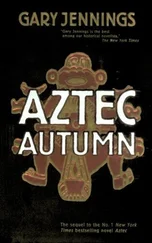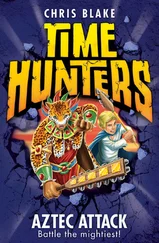Gary Jennings - Aztec
Здесь есть возможность читать онлайн «Gary Jennings - Aztec» весь текст электронной книги совершенно бесплатно (целиком полную версию без сокращений). В некоторых случаях можно слушать аудио, скачать через торрент в формате fb2 и присутствует краткое содержание. Жанр: Старинная литература, на английском языке. Описание произведения, (предисловие) а так же отзывы посетителей доступны на портале библиотеки ЛибКат.
- Название:Aztec
- Автор:
- Жанр:
- Год:неизвестен
- ISBN:нет данных
- Рейтинг книги:4 / 5. Голосов: 1
-
Избранное:Добавить в избранное
- Отзывы:
-
Ваша оценка:
- 80
- 1
- 2
- 3
- 4
- 5
Aztec: краткое содержание, описание и аннотация
Предлагаем к чтению аннотацию, описание, краткое содержание или предисловие (зависит от того, что написал сам автор книги «Aztec»). Если вы не нашли необходимую информацию о книге — напишите в комментариях, мы постараемся отыскать её.
"Anyone who reads, anyone who still lusts for adventure or that book you can't put down, will glory in Aztec."--Los Angeles Times
Aztec
Aztec
Aztec — читать онлайн бесплатно полную книгу (весь текст) целиком
Ниже представлен текст книги, разбитый по страницам. Система сохранения места последней прочитанной страницы, позволяет с удобством читать онлайн бесплатно книгу «Aztec», без необходимости каждый раз заново искать на чём Вы остановились. Поставьте закладку, и сможете в любой момент перейти на страницу, на которой закончили чтение.
Интервал:
Закладка:
That, or so I have been told, and so I believe, was the origin of the Flowery Wars, and this is how the first of them was arranged:
The mightiest and most centrally situated powers in this valley constituted a Triple Alliance: we the Mexíca with our capital on the island of Tenochtítlan, the Acolhua with their capital at Texcóco on the lake's eastern shore, and the Tecpanéca with their capital at Tlácopan on the western shore. There were three lesser peoples to the southeast: the Texcalteca, of whom I have already spoken, with their capital at Texcala; the Huexotin with their capital at Huexotzinco; and the once mighty Tya Nuü—or Mixteca, as we called them—whose domain had shrunken until it consisted of little more than their capital city of Chololan. The first were our enemies, as I have said; the latter two had long ago been made our tribute payers and, like it or not, our occasional allies. All three of those nations, however, like all three of ours in the Alliance, were being devastated by the Hard Times.
After Motecuzóma's conference with his Speaking Council, he conferred also with the rulers of Texcóco and Tlácopan. Those three together drafted and sent a proposal to the three rulers in the cities of Texcala, Chololan, and Huexotzinco. In essence it said something like this:
"Let us all make war that we may all survive. We are diverse peoples, but we suffer the same Hard Times. The wise men say that we have only one hope of enduring: to sate and placate the gods with blood sacrifices. Therefore, we propose that the armies of our three nations meet in combat with the armies of your three nations, on the neutral plain of Acatzinco, safely far to the southeast of all our lands. The fighting will not be for territory, nor for rule, nor for slaughter, nor for plunder, but simply for the taking of prisoners to be granted the Flowery Death. When all participating forces have captured a sufficiency of prisoners for sacrifice to their several gods, this will be mutually made known amongst the commanders and the battle will end forthwith."
That proposal, which you Spaniards say you find incredible, was agreeable to all concerned—including the warriors whom you have called "stupidly suicidal" because they fought for no apparent end except the extremely likely and sudden end to their own lives. Well, tell me, what professional soldier of your own would refuse any excuse for a battle, in preference to humdrum, peacetime garrison duty? At least our warriors had the stimulus of knowing that if they died in combat or on an alien altar, they earned all people's thanks for pleasing the gods, while they earned the gods' gift of life in a blissful afterworld. And, in those Hard Times, when so many died of inglorious starvation, a man had even more reason for preferring to die by the sword or the sacrificial knife.
So that first battle was planned, and it was fought as planned—though the plain of Acatzinco was a dreary long march from anywhere, so all six armies had to rest for a day or two before the signal was given to commence hostilities. Other intentions notwithstanding, a goodly number of men were killed; some inadvertently, by chance and accident; some because they or their opponents fought too exuberantly. It is difficult for a warrior, trained to kill, to refrain from killing. But most, as agreed, struck with the flat of the maquahuitl, not with the obsidian edge. The men thus stunned were not dispatched by the Swallowers but were quickly bound by the Swaddlers. After only two days, the priest-chaplains who marched with each army decided that prisoners enough had been taken to satisfy them and their gods. One after another, the commanders unfurled the prearranged banners, the knots of men still grappling on the plain disengaged, the six armies reassembled and marched wearily home, leading their even wearier captives.
That first, tentative War of Flowers took place in midsummer, normally also mid-rainy season, but in those Hard Times just another of the interminable hot, dry spells. And one other thing had been prearranged by the six rulers of the six nations: that all of them should sacrifice all their prisoners in their six capital cities on the same day. No one remembers the exact count, but I suppose several thousand men died that day in Tenochtítlan, in Texcóco, in Tlácopan, in Texcala, in Chololan, in Huexotzinco. Call it coincidence if you like, reverend friars, since the Lord God was of course not involved, but that day the casks of clouds at last broke their seals, and the rain poured down on all this extensive plateau, and the Hard Times came to an end.
That very day, also, many people in the six cities enjoyed full bellies for the first time in years, when they dined on the remains of the sacrificed xochimíque. The gods were satisfied to be fed merely with the ripped-out hearts heaped on their altars; they had no use for the remainder of the victims' bodies, but the gathered people did. So, as the corpse of each xochimíqui, still warm, rolled down the steep staircase of each temple pyramid, the meat cutters waiting below dissected it into its edible parts and distributed those among the eager folk crowding each plaza.
The skulls were cracked and the brains extracted, the arms and legs were cut into manageable segments, the genitals and buttocks were sliced off, the livers and kidneys were cut out. Those food portions were not just flung to a slavering mob; they were distributed with admirable practicality, and the populace waited with admirable restraint. For obvious reasons, the brains went to priests and wise men, the muscular arms and legs to warriors, the genitalia to young married couples, the less significant buttocks and tripes were presented to pregnant women, nursing mothers, and families with many children. The leftovers of heads, hands, feet, and torsos, being more bone than meat, were put aside to fertilize the croplands.
That feast of fresh meat may or may not have been an additional advantage foreseen by the planners of the Flowery War; I do not know. All the various peoples in these lands had long ago eaten every still-existing game animal, every domesticated bird and dog raised for food. They had eaten lizards and insects and cactus. But they never had eaten any of their relatives and neighbors who succumbed to the Hard Times. It might be thought an unconscionable waste of available nutriment, but in every nation the starving people had disposed of their starved fellows by burial or burning, according to their custom. Now, however, thanks to the War of Flowers, they had an abundance of bodies of unrelated enemies—even if those were enemies only by an exaggeration of definition—and so there was no compunction about making a meal of them.
In the aftermath of later wars, there was never again such an immediate butchery and gorging. Since there was never again such a massed and ravenous hunger to assuage, the priests set up rules and rituals to formalize the eating of captives' flesh. The victorious warriors of later wars took only token morsels of their dead enemies' muscular parts, and partook of them ceremoniously. The bulk of the meat was apportioned out among the really poor folk—generally meaning the slaves—or was fed to the animals in those cities which, like Tenochtítlan, maintained a public menagerie.
Human flesh, like almost any other animal flesh, when properly hung, aged, seasoned, and broiled, makes a tasty dish, and it is suitable for sustenance when there is no other meat. However, just as it can be proven that close-kinship marriage among our noble families did not result in superior offspring, but more often the contrary, I think it could be equally demonstrated that humans who feed only on humans must similarly decline. If a family's bloodline is best improved by marriage outside the line, so a man's blood must be best strengthened by the ingestion of other animals. Thus, with the passing of the Hard Times, the practice of eating the slain xochimíque became—for all but the desperate and degenerate poor—only one more religious observance, and a minor one.
Читать дальшеИнтервал:
Закладка:
Похожие книги на «Aztec»
Представляем Вашему вниманию похожие книги на «Aztec» списком для выбора. Мы отобрали схожую по названию и смыслу литературу в надежде предоставить читателям больше вариантов отыскать новые, интересные, ещё непрочитанные произведения.
Обсуждение, отзывы о книге «Aztec» и просто собственные мнения читателей. Оставьте ваши комментарии, напишите, что Вы думаете о произведении, его смысле или главных героях. Укажите что конкретно понравилось, а что нет, и почему Вы так считаете.











